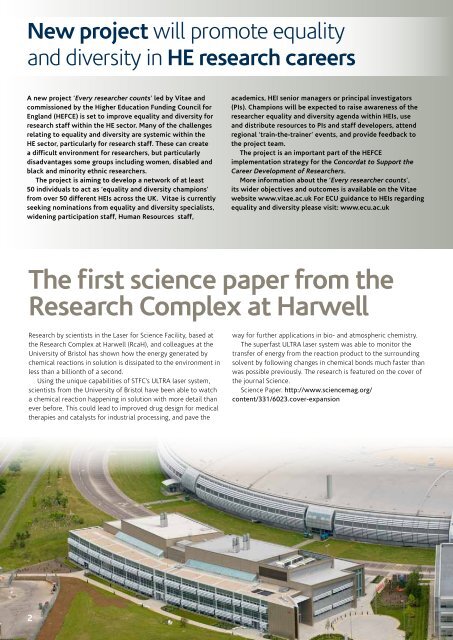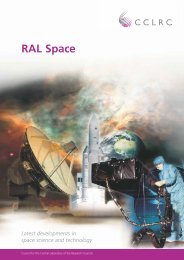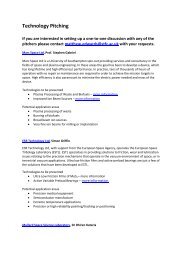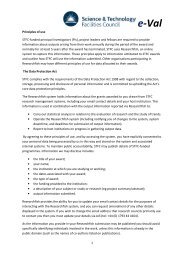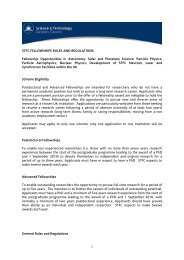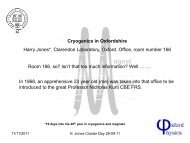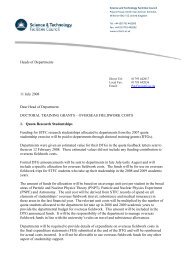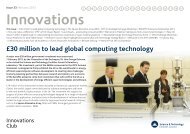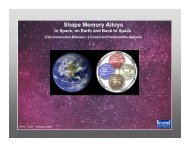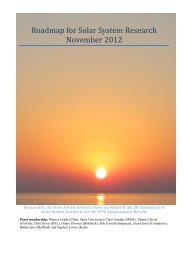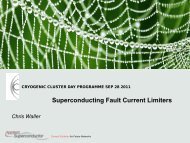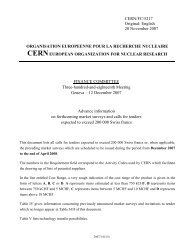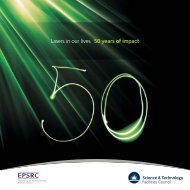Fascination - Science & Technology Facilities Council
Fascination - Science & Technology Facilities Council
Fascination - Science & Technology Facilities Council
You also want an ePaper? Increase the reach of your titles
YUMPU automatically turns print PDFs into web optimized ePapers that Google loves.
New project will promote equality<br />
and diversity in HE research careers<br />
A new project ‘Every researcher counts’ led by Vitae and<br />
commissioned by the Higher Education Funding <strong>Council</strong> for<br />
England (HEFCE) is set to improve equality and diversity for<br />
research staff within the HE sector. Many of the challenges<br />
relating to equality and diversity are systemic within the<br />
HE sector, particularly for research staff. These can create<br />
a difficult environment for researchers, but particularly<br />
disadvantages some groups including women, disabled and<br />
black and minority ethnic researchers.<br />
The project is aiming to develop a network of at least<br />
50 individuals to act as ‘equality and diversity champions’<br />
from over 50 different HEIs across the UK. Vitae is currently<br />
seeking nominations from equality and diversity specialists,<br />
widening participation staff, Human Resources staff,<br />
academics, HEI senior managers or principal investigators<br />
(PIs). Champions will be expected to raise awareness of the<br />
researcher equality and diversity agenda within HEIs, use<br />
and distribute resources to PIs and staff developers, attend<br />
regional ‘train-the-trainer’ events, and provide feedback to<br />
the project team.<br />
The project is an important part of the HEFCE<br />
implementation strategy for the Concordat to Support the<br />
Career Development of Researchers.<br />
More information about the ‘Every researcher counts’,<br />
its wider objectives and outcomes is available on the Vitae<br />
website www.vitae.ac.uk For ECU guidance to HEIs regarding<br />
equality and diversity please visit: www.ecu.ac.uk<br />
The first science paper from the<br />
Research Complex at Harwell<br />
Research by scientists in the Laser for <strong>Science</strong> Facility, based at<br />
the Research Complex at Harwell (RcaH), and colleagues at the<br />
University of Bristol has shown how the energy generated by<br />
chemical reactions in solution is dissipated to the environment in<br />
less than a billionth of a second.<br />
Using the unique capabilities of STFC’s ULTRA laser system,<br />
scientists from the University of Bristol have been able to watch<br />
a chemical reaction happening in solution with more detail than<br />
ever before. This could lead to improved drug design for medical<br />
therapies and catalysts for industrial processing, and pave the<br />
way for further applications in bio- and atmospheric chemistry.<br />
The superfast ULTRA laser system was able to monitor the<br />
transfer of energy from the reaction product to the surrounding<br />
solvent by following changes in chemical bonds much faster than<br />
was possible previously. The research is featured on the cover of<br />
the journal <strong>Science</strong>.<br />
<strong>Science</strong> Paper. http://www.sciencemag.org/<br />
content/331/6023.cover-expansion<br />
2


